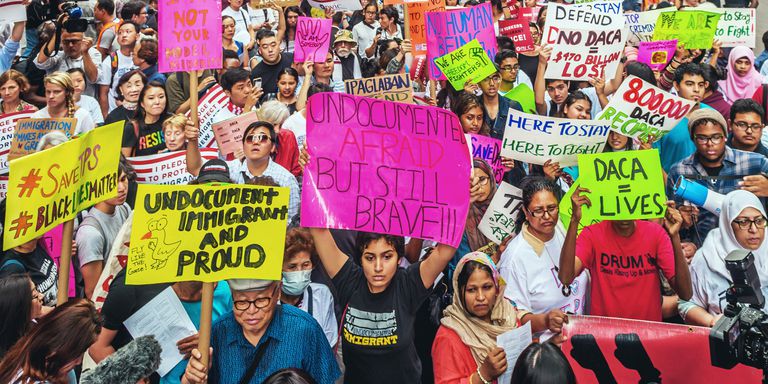
What happens if Congress fails to make a deal on DACA by March 5?
The Economist, February 22, 2018
The likeliest outcome is a return to the status quo before 2012
NOEMI LUNA was a teenager when she first realised she was not living legally in the United States. “When you’re little you go to school with other kids. You grow up with them and believe you’re the same, that you’re equal,” she muses. But when her peers started getting driver’s licences and travelling out of the country her parents, who brought Ms Luna to America from Mexico when she was two years old, explained such things would not be possible for her. She was undocumented.
Deferred Action for Childhood Arrivals (DACA), a policy President Barack Obama implemented by executive action in 2012, changed that. The programme allowed undocumented immigrants brought to America as children to study and work in America legally for renewable increments of two years, so long as they had committed no crimes and met certain educational requirements. Now Ms Luna’s future, as well as those of nearly 700,000 other so-called Dreamers, is again uncertain.
In September 2017 President Donald Trump announced he would phase out the DACA programme, claiming that Mr Obama had not possessed a mandate to implement it with no input from Congress. But Mr Trump did not end the policy outright. He gave DACA recipients whose status would expire before March 5th one month to renew it for another two years. Those whose protected status lapsed after that date would not enjoy the same privilege. When their status lapsed, they would be eligible for removal. Politicians took note. Congress would need to reach a legislative solution by March 5th or risk exposing Dreamers to deportation.
Or so they thought. In January a district-court judge in San Francisco ordered the Trump administration to continue renewing DACA applications while the underlying legality of ending the programme is worked out. To the surprise of many, instead of asking for a legal “stay” that would have reversed the injunction, the federal government complied. Yet the administration wants to bypass the federal appeals court. It has asked the Supreme Court to review the case directly instead of letting it wind its way through the court system first, as would normally be the case.
The Supreme Court has yet to indicate whether it will take up the case but is expected to do so by February 23rd. On February 13th a New York court issued an order similar to the San Francisco one, mandating that the administration continue to renew DACA applications. This development makes the Supreme Court’s acceptance of the case much more likely, says Leon Fresco, who previously worked on immigration litigation at the Department of Justice and now serves as an immigration lawyer at Holland & Knight, a law firm. If the Supreme Court does accept, the soonest it would rule is early May. If it does not, the case could take another year to work its way through the legal system.
In the meantime, even though March 5th is no longer a hard deadline, some in Congress are trying to find a legislative fix which would render the court case immaterial. Versions of bills shielding Dreamers from deportation have been introduced more than 20 times since 2001 when the first such proposal was floated, according to LawLogix, a legal software group. Despite enjoying support from Republicans, Democrats and the general public, the bills have floundered. If the court’s ruling is unfavourable to DACA and no legislative agreement is reached, the law will return to where it was before 2012, and people who arrived in America as minors will again be subject to deportation. That does not mean they will all be deported. More than 10m people are also eligible for deportation and, short of war or pandemic, nobody has yet devised a method for expelling humans on that scale. But it would reintroduce an arbitrary element to a system that is already an act of self-harm.